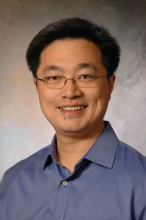ChEMS Seminar: Silicon Nanowire-Based Biophysical Tools

Department of Chemistry
The James Franck Institute
The Institute for Biophysical Dynamics
The University of Chicago, Chicago, IL
Abstract: Biological systems are organized hierarchically, with unique characteristics and functionalities spanning multiple length scales; some examples include collagen fibers, metabolic networks and chromosome organization. It is important to select the right organizational length scale for device and biointerface design. In the case of sub-cellular organization, this length scale is on the order of tens to hundreds of nanometers. In this talk, Tian will present several chemical strategies for three-dimensional silicon nanowire-based materials. These materials are deformable and have been tested with extra- and intracellular components (i.e., extracellular matrix, cytoskeleton and phospholipid bilayer) with an initial emphasis on mechanical interactions and optical control. These studies will deepen our understanding of the fundamental limits of physical and biological signal transduction between subcellular components and synthetic systems. Tian will also discuss future opportunities in materials science toward seamless biointegration.
Bio: Bozhi Tian received his Ph.D. degree in physical chemistry from Harvard University in 2010. His Ph.D. research with Professor Charles Lieber included new nanowire materials synthesis, the fundamental study of high-performance nanowire photovoltaics and the application of novel nanowire devices in cells and tissue. He worked with Professors Robert Langer and Daniel Kohane as a postdoctoral scholar in tissue engineering, and is now an assistant professor at the University of Chicago working on semiconductor-based cellular biophysics. Tian’s accolades include Presidential Early Career Awards for Scientists and Engineers (PECASE), 2016 NIH New Innovator award, 2016 ONR Young Investigator award, 2016 Sloan Fellowship, 2015 AFOSR Young Investigator award, 2013 NSF CAREER award, 2013 Searle Scholar award and 2012 TR35 honoree.
Host: Professor Alon Gorodetsky
Share
Upcoming Events
-
MSE 298 Seminar: Radiation Resistance and Mechanical Response of Ceramics in Extreme Environments
-
EECS 294 Seminar: Programming Light Diffraction for Information Processing and Computational Imaging
-
MAE 298 SEMINAR: Stretchable Electronics for Soft Biological and Robotic Systems
-
CBE Distinguished Lecture/CBE 298 Seminar: Computational Design of Peptides as Detectors, Sensors and Drugs
-
MSE 298 Seminar: Molecular Modeling in the Age of AI - From Energy Materials to Device Simulations
